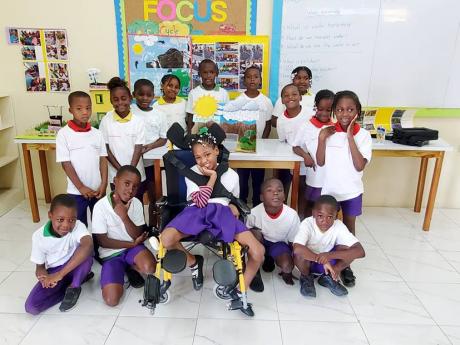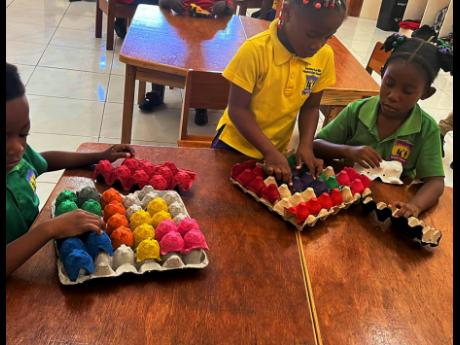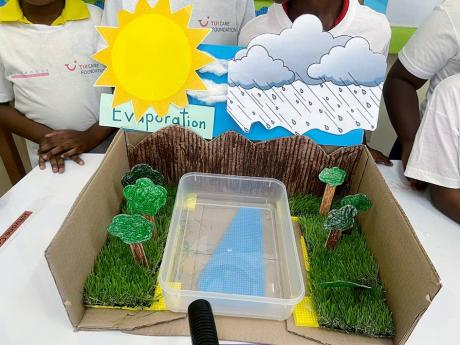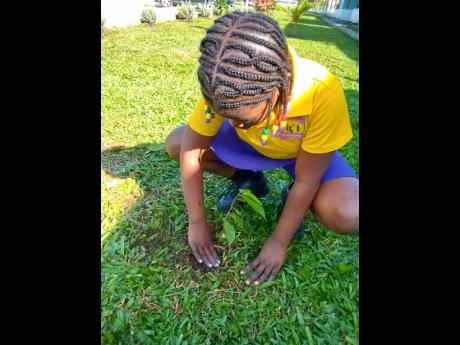Young children encouraged to get involved in addressing climate change
The participation of young children in initiatives aimed at addressing issues regarding climate change must be encouraged.
This sentiment was shared by Sheneka Robinson-Wright, project director, TUI Junior Academy Jamaica.
Speaking with The Gleaner on Tuesday, Robinson-Wright stated that the younger generation of students must be exposed to environmental education while in school in order to help combat the negative effects of climate change on the environment.
She stated that it was important to educate kids on the advantages of sustainable living practices for the continuation of human life on Earth, as well as for the preservation of the environment.
But education alone is not effective, she argued. Therefore, engaging children in a practical way would ensure that the information passed on was being comprehended.
In western Jamaica, this approach has already begun. Through a recent partnership between the Rockhouse Foundation and the TUI Care Foundation, a three-year initiative dubbed the ‘TUI Junior Academy Jamaica’ was born and commenced in January.
The project is aimed at tackling issues surrounding climate change to involve the commissioning of solar energy and water harvesting systems at the Savanna-la-Mar Inclusive Academy (Sav Inclusive) located in Westmoreland and the development and implementation of a sustainability curriculum that will benefit approximately 1,400 children across six schools supported by the Rockhouse Foundation.
Additionally, the project empowers young people to become ‘Eco Champions’ within their communities while also inspiring them to see the value of protecting nature and wildlife.
“How you dispose of things, how you conserve energy, how you conserve water and use things, [is] something we are working on for it to be a part of their (children) psyche ... [to be] a part of the school’s culture,” she said.
COMPOSTING
Using composting as an example, Robinson-Wright said if children were engaged in putting aside the necessary materials in a compost bin and then utilising these materials in school gardens for the nurturing of plants, then this would solidify the information learnt about what composting means.
“We want to make it fun because they are kids so the fun aspect of it is so important,” she said.
“Climate change is here, these things that we are talking about in the past, we can see the changes happening even now. I mean, when I was little, I remember there was a tropical depression and how long it may have taken to form [but] nowadays, you just hear something move from a tropical storm to a category four or five hurricane in such a short window [of time],” she said.
Since Sunday, the National Solid Waste Management Authority (NSWMA) and its regional offices have been observing National Environmental Awareness Week under the theme, ‘End Travel Waste’.
Solid Waste Day was also observed on Tuesday. The week of activities will end on Saturday.
Robinson-Wright added that the idea surrounding what the environment is was not exclusive to the natural resources, geographical areas, and animals, but that it is something that included human life as well and the way in which man functions in the space.
“So, taking care of the environment is taking care of ourselves and it’s important for us to develop those attitudes in children so that they can be more responsible as adults,” she said.
The NSWMA has, over the years, developed various initiatives targeted at ridding the society of undisposed waste – its latest being the ‘Klean Kingston’ waste-disposal initiative which forms part of its ‘Clean City’ programme designed to target the backlog of garbage in town centres and business districts.
MAJOR ISSUE
Robinson-Wright lamented the attitude of many Jamaicans towards keeping the environment clean, citing littering as a major issue that the nation continues to grapple with as uncontained pieces of garbage can be seen along the beaches, roadways and in other public spaces.
She said that it is hoped that through these hands-on, nature-based experiences and excursions that students will be exposed to during the execution of the project, their thought process about what environmental care entails will, thereafter, be integrated in school life so that students, teachers and the wider school community will ensure to put measures in place to operate sustainably.
Savanna-la-Mar Inclusive Academy in Westmoreland is an institution that caters to special needs children, those living with and without a disability and typical learning children.
It is equipped with physiotherapists and speech therapists. Each class also consists of a teacher, an assistant, and a caregiver. The institution, which has 190 students, was built, and is supported by the Rockhouse Foundation, which caters to children aged three to those in grade 3.
It is currently being expanded to include a fully sustainable primary and secondary school that will accommodate another 600 students.
Since the foundation’s inception, US$8 million has been raised and expended. The foundation has also transformed and modernised six schools in western Jamaica. In addition to this they have completed the renovation and expansion of the Negril Community Library.
“We just need to change our entire way of thinking and of doing things, and it’s just so important to get the children involved,” Robinson-Wright said.
During the COVID-19 pandemic, the Rockhouse and TUI Care foundations had a tremendous impact on reducing food insecurity in western Jamaica. They distributed 450 tons of food over a 20-month period, which benefited 1,000 individuals weekly.
It was following the success of the food distribution project that the TUI Junior Academy Jamaica was developed.




